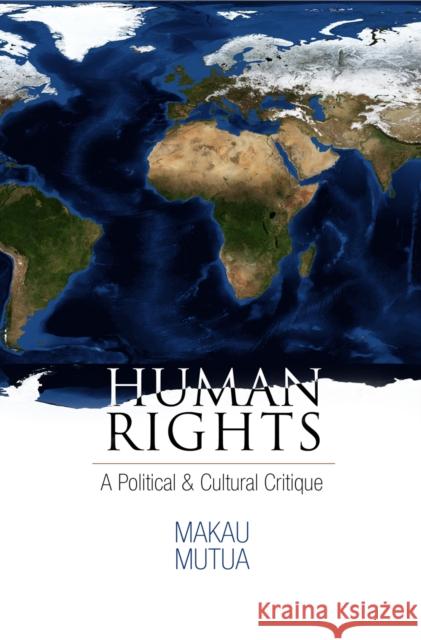Human Rights: A Political and Cultural Critique » książka
Human Rights: A Political and Cultural Critique
ISBN-13: 9780812220490 / Angielski / Miękka / 2008 / 264 str.
Human Rights A Political and Cultural Critique Makau Mutua "Engaged, sometimes passionate. . . . Mutua's book is an inspiring one. . . . Viewing the human rights commitment as a self-justifying crusade, he points toward an innovative direction of research."--Human Rights Review "A welcome and timely contribution to a human rights discourse that is becoming increasingly monolithic. Mutua is right when he argues that the human rights movement is neither nonideological nor postideological. The mantra of universal morality tends to mask its deeply political character."--Ethics and International Affairs In 1948 the United Nations adopted the Universal Declaration of Human Rights, and with it a profusion of norms, processes, and institutions to define, promote, and protect human rights. Today virtually every cause seeks to cloak itself in the righteous language of rights. But even so, this universal reliance on the rights idiom has not succeeded in creating common ground and deep agreement as to the scope, content, and philosophical bases for human rights. Makau Mutua argues that the human rights enterprise inappropriately presents itself as a guarantor of eternal truths without which human civilization is impossible. Mutua contends that in fact the human rights corpus, though well meaning, is a Eurocentric construct for the reconstitution of non-Western societies and peoples with a set of culturally biased norms and practices. Mutua maintains that if the human rights movement is to succeed, it must move away from Eurocentrism as a civilizing crusade and attack on non-European peoples. Only a genuine multicultural approach to human rights can make it truly universal. Indigenous, non-European traditions of Asia, Africa, the Pacific, and the Americas must be deployed to deconstruct--and to reconstruct--a universal bundle of rights that all human societies can claim as theirs. Makau Mutua is Professor of Law and Director of the Human Rights Center at the State University of New York at Buffalo Law School. Pennsylvania Studies in Human Rights 2002 264 pages 6 1/8 x 9 1/4 ISBN 978-0-8122-2049-0 Paper $26.50s 17.50 ISBN 978-0-8122-0415-5 Ebook $26.50s 17.50 World Rights Law, Public Policy Short copy: Human Rights: A Political and Cultural Critique provides a bracing and controversial analysis of the scope of human rights and lays the groundwork for a multicultural and more universal understanding of these rights.
Human RightsA Political and Cultural CritiqueMakau Mutua"Engaged, sometimes passionate. . . . Mutua's book is an inspiring one. . . . Viewing the human rights commitment as a self-justifying crusade, he points toward an innovative direction of research."--Human Rights Review"A welcome and timely contribution to a human rights discourse that is becoming increasingly monolithic. Mutua is right when he argues that the human rights movement is neither nonideological nor postideological. The mantra of universal morality tends to mask its deeply political character."--Ethics and International AffairsIn 1948 the United Nations adopted the Universal Declaration of Human Rights, and with it a profusion of norms, processes, and institutions to define, promote, and protect human rights. Today virtually every cause seeks to cloak itself in the righteous language of rights. But even so, this universal reliance on the rights idiom has not succeeded in creating common ground and deep agreement as to the scope, content, and philosophical bases for human rights.Makau Mutua argues that the human rights enterprise inappropriately presents itself as a guarantor of eternal truths without which human civilization is impossible. Mutua contends that in fact the human rights corpus, though well meaning, is a Eurocentric construct for the reconstitution of non-Western societies and peoples with a set of culturally biased norms and practices.Mutua maintains that if the human rights movement is to succeed, it must move away from Eurocentrism as a civilizing crusade and attack on non-European peoples. Only a genuine multicultural approach to human rights can make it truly universal. Indigenous, non-European traditions of Asia, Africa, the Pacific, and the Americas must be deployed to deconstruct--and to reconstruct--a universal bundle of rights that all human societies can claim as theirs.Makau Mutua is Professor of Law and Director of the Human Rights Center at the State University of New York at Buffalo Law School.Pennsylvania Studies in Human Rights2002 | 264 pages | 6 1/8 x 9 1/4ISBN 978-0-8122-2049-0 | Paper | $26.50s | L17.50 ISBN 978-0-8122-0415-5 | Ebook | $26.50s | L17.50 World Rights | Law, Public PolicyShort copy:Human Rights: A Political and Cultural Critique provides a bracing and controversial analysis of the scope of human rights and lays the groundwork for a multicultural and more universal understanding of these rights.











